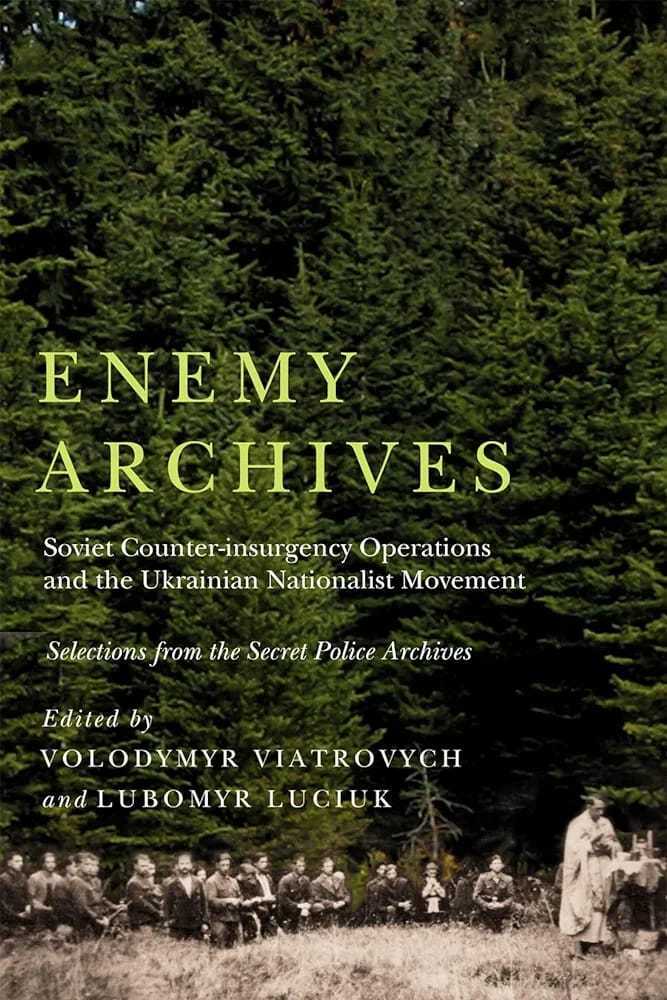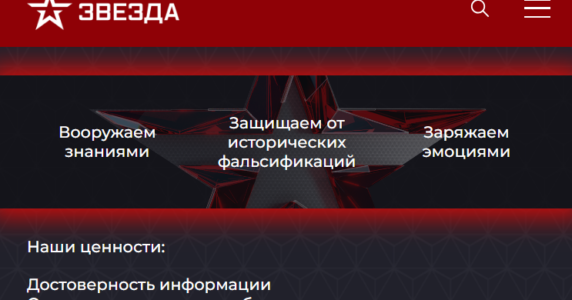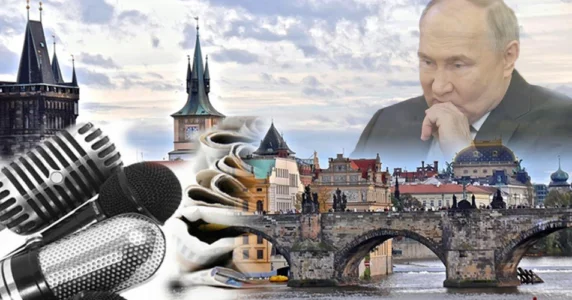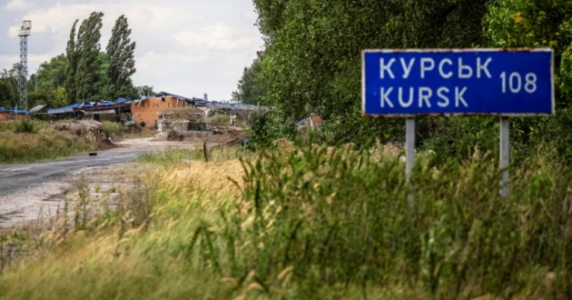Navigation and useful materials
On January 22, 2024, the American Library Association (ALA) nominated the English-language compilation of documents “Enemy Archives. Soviet Counterinsurgency Operations and the Ukrainian Nationalist Movement – Selections from the Secret Police Archives”, book by Professor Lubomyr Luciuk and Volodymyr Viatrovych, in the list of the Best Historical Materials published in 2023. This work, based on the documents of the Organization of Ukrainian Nationalists, the Ukrainian Insurgent Army and the Soviet State Security Agencies, gives a coverage of a difficult period of Ukrainian history: the struggle of Ukrainians for an independent state in the 1920-50s and the brutal anti-partisan war waged by the soviet authorities in the 1940-50s, which was accompanied by massive war crimes against Ukrainians. The compilation of documents aims to bring previously unknown pages of Ukrainian history to the English-speaking audience.
On March 17, 2024, it became known that the American Library Association has retracted this work from the list of the Best Historical Materials of 2023. The reason was a publication in The Nation magazine by Lev Golinkin entitled “Why Is the American Library Association Whitewashing the History of Ukrainian Nazis?” This publication was actively distributed by a part of the Western academic environment, which consistently promotes the thesis about “Ukrainian Nazism”. The ALA did not explain in its statement the reasons of the retraction of “Enemy Archives”, but there is a high probability that it was precisely because of the publicity of Golinkin’s article that it decided to retract this compilation of documents from the Best Historical Materials List.

The Centre for Strategic Communications and Information Security has analysed the manipulations in Lev Golinkin’s text and explains why this is an attack not only against Ukrainian history, but also against academic freedom, which should be a basic concept for science.
Retraction of the archival documents compilation for political reasons is incompatible with the concept of freedom of speech and scientific research
After the beginning of the Russian attack on Ukraine in 2014, the interest of Western researchers of various humanitarian specialities, in particular historical disciplines, is steadily growing. The opening of the communist regime archives facilitated researches, it became possible due to the decommunization laws. However, unfortunately, Western researchers often face the problem of not knowing the Ukrainian language, and sometimes even Russian, as the language of documents of USSR repressive structures. Expansion of hostilities over a larger territory and the constant missile attacks on Ukrainian cities, after the beginning of a full-scale Russian invasion on February 24, 2022, became a problem for the studies of foreign historians. Not every Western historian is ready to work with Ukrainian archives documents in such conditions. Moreover, the Ukrainian archives themselves are under a very real threat of destruction as a result of Russian attacks. After all, those Ukrainian historians who remain on the territory of Ukraine are under constant threat of death or injury both as a result of Russian shelling and directly during the defence of Ukraine with weapons in their hands.
The compilation of translated documents “Enemy Archives” is intended to show the Western audience at least a small part of the documents of such a difficult page in the history of Ukraine as the struggle of the Organization of Ukrainian Nationalists and the Ukrainian Insurgent Army. And the inclusion into the list of “The Best Historical Materials” of ALA, was in fact a recognition of the enormous work of translating and publishing almost 900 pages of archival documents, most of which were still unknown in the West.
We would like to explain why the retraction of “Enemy Archives” from the List is a mistake and a flagrant violation of scientific standards. And we hope this situation will be fixed. Publication of such archival documents does not reflect the political or historical views of the authors. From the point of view of science, documents are sources and cannot be “good” or “bad”. Documents simply reflect the historical events and processes that took place. It is already the task of researchers to analyse them and draw conclusions as impartially as possible. The authors of “Enemy Archives” gave a chance to do this. But the personal attack on Professor Lubomyr Luciuk and Volodymyr Viatrovych from the magazine The Nation and Lev Golinkin personally dealt a serious reputational blow to the possibility of getting to know these sources. And all this happened due to a whole series of manipulations around the narrative about “Ukrainian Nazis”, which we will consider below.
Manipulation No.1: “Laws glorifying Ukrainian Nazi collaborators and perpetrators of the Holocaust”
In his publication, Lev Golinkin mentions the decommunization laws package, and claims that they glorify Nazi collaborators and persons involved in the genocide of Jews. However, the author is not familiar with the decommunization laws and does not refer to them. And his statement about the glorification of the Nazis in Ukrainian legislation is a lie.
In reality, the Law of Ukraine “On the Condemnation of the Communist and National Socialist (Nazi) Regimes, and Prohibition of Propaganda of Their Symbols” recognizes the criminal nature of the Nazi regime during occupation of Ukraine as “the one that exercised the policy of state terror characterized by numerous violations of human rights in the form of individual and mass murders, slaughters, deaths, deportations, tortures, use of forced labour and other forms of mass physical terror, persecution for ethnic, violation of the freedom of conscience, thought, expression, press and lack of political pluralism and due to these reasons, based on the facts established by the Nurnberg International Military Tribunal of 1945-1946, it is condemned as incompatible with the fundamental human and citizen’s rights and liberties.” Article 3 prohibits the propaganda of the Communist and Nazi regimes, Article 4 prohibits the use of their symbols, and Article 5 determines the need to investigate and promulgate information about the crimes of both totalitarian regimes. (Law 317-VIII).
Another of the Laws “On Perpetuation of the Victory over Nazism in World War II of 1939-1945” separately defines a list of measures to honor the memory of both fighters against Nazism and its victims. (Law 315-VIII). The Law “On the Legal Status and Honoring the Memory of Fighters for Ukraine’s Independence in the Twentieth Century” defines the list of Ukrainian organizations that are honored by the state, and among them there is no formation created by the Third Reich, including punitive formations participating in the Holocaust. (Law 314-VIII) And the law “On access to Archives of Repressive Agencies of Totalitarian Communist Regime of 1917-1991” determines the complete declassification of communist archives on the territory of Ukraine. (Law 316-VIII)
Manipulation No.2: “The Organization of Ukrainian Nationalists cooperated with the Nazis in the extermination of tens thousands of Jews, while the Ukrainian Insurgent Army eliminated thousands of Jews and 70-100 thousand Poles”
In reality, there are no testimonies and documentary evidence that would confirm the cooperation of the Organization of Ukrainian Nationalists (OUN) with the Nazis in the mass murder of Jews. There was a situational political “union” on the eve and at the beginning of the German-Soviet war in 1941, which the OUN planned to use for the declaration of independence of Ukraine, but not for the mass murder of Jews. Such a “union” turned out to be wrong; it was based on the previous experience of the cooperation of the Ukrainian People’s Republic with the German Empire in 1918. And the OUN leaders felt this mistake almost immediately after the beginning of the German-Soviet war, since the Nazis were only interested in occupation of Ukraine.
The Nazis opposed independent Ukraine immediately after the proclamation of the Act on Restoration of the Ukrainian State on June 30, 1941, and arrested the leadership of the OUN led by Stepan Bandera and Yaroslav Stetsk. After that, the OUN went underground, and from the end of 1942, began to form armed units of the Ukrainian Insurgent Army, which waged a guerrilla war against both the Nazi and communist regimes. From the beginning of 1942, the Nazi repressions also covered the OUN led by Andriy Melnyk. How OUNs, as organizations, were be able to cooperate with the Nazis during the Holocaust, while whose leaders were outlawed by the Nazis, is unclear.
The Nazi invaders created various formations of auxiliary police and concentration camp guards, whose members were representatives of the local population with different political orientations, nationalities, former Soviet war prisoners, criminals, etc., who were related to the Holocaust: from escort to places of murder, and to directly participating in executions. However, none of these formations were subordinated to the Organization of Ukrainian Nationalists of both directions, they were carried out the orders of the Nazi occupation administration of military zone such as “Reichskommissariat Ukraine,” or “Nazi General Governor,”. The creation of such auxiliary formations was the general policy of the Nazis in the occupied territories of Central and Eastern Europe.
There is also no confirmation of the words that the Ukrainian Insurgent Army (UIA) as an organized force participated in the murder of Jews. Moreover, a small number of Jews, who survived the Holocaust, joined the UIA.
The thesis about the murders of Poles by UIA soldiers is incomplete, as it does not mention the much broader context of the Polish-Ukrainian conflict between the undergrounds of both nations, with the periodic intervention of Nazis and Communists punitive formations. As a result of this conflict, tens thousands civilians, both Poles and Ukrainians, died in the west of modern Ukraine and the east of modern Poland, during 1942-1947. This conflict ended after the Second World War with an attempt at reconciliation between the Ukrainian and Polish undergrounds and even joint operations of the UIA with the Polish underground organization WiN against the communist regime. And the finale was the deportation of Poles from Western Ukraine and Ukrainians from Poland, organized by Stalin under the guise of “population exchange” in 1944-46, and the operation “Visula” in 1947 on the territory of communist Poland.
After gaining independence in 1991, Ukraine has repeatedly condemned the Holocaust and is doing everything possible to honor the memory of its victims. Let’s remember that in Soviet Union commemoration of the Jewish genocide victims was impossible due to the state Anti-Semitism policy. After the fall of communism in 1991, Ukraine and Poland jointly condemned the killings of civilians of both nationalities. Research, which should establish all the circumstances and the number of victims on both sides, continues with the efforts of the academic community of Ukraine and Poland. And their memory is honored in the form of memorial events on both sides of the Ukrainian-Polish border.
Manipulation No.3: “Claim that the Organization of Ukrainian Nationalists is Nazi criminals is a lie”
In fact, after the Second World War, Ukrainian and Jewish diasporas, in the Western Europe and North America, began to cooperate for both the national liberation of Ukraine and the fight against Anti-Semitism in the Soviet Union. This greatly worried the party leadership and the Committee for State Security of the USSR (KGB), which began a series of active measures to discredit the idea of inter-ethnic reconciliation. For this purpose, using the domestic and foreign intelligence network, the Soviet press, as well as the foreign press and organizations “blindly”, the KGB disseminated materials that were supposed to inflame the Ukrainian-Jewish conflict, not shying away from falsifications. In particular, this concerned the alleged participation of the OUN in the Holocaust. This disinformation campaign continued until the USSR collapse. You can get acquainted with some such operations here.
Unfortunately, the KGB special operations gave results, and now the history of the Ukrainian national liberation movement became one of the most mythologized pages of the Ukrainian history.
Inciting interethnic enmity in Ukraine, discrediting Ukrainian history and people who fought and continue to fight for Ukraine’s independence, is still being used by the special services of the Russian Federation as a strategy to destroy Ukraine as a state.
Manipulation No.4: “The 14th Waffen Grenadier Division of the SS Galician”
Golinkin paid excessive attention to the question of the 14th Waffen Grenadier Division of the SS Galician, although in the compilation of documents “Enemy Archives”, it is mentioned only a dozen times, mainly in documents, as well as in the introduction and references. And it is inevitable, considering that the history of this military formation is an integral part of the local historical context. Censoring this would be strange. How unfair it would be to call the military division’s war criminals, because they were repeatedly inspected by the Western allies in war prisoner camps after the Second World War. Separately, in response to Soviet accusations against Canada of harboring war criminals, the Deschene government’s Commission confirmed that those former soldiers from the division who immigrated to Canada did not participate in war crimes during the Second World War. Opposing this position, Lev Golinkin does not cite documentary evidence for his words.
The story of the 14th Waffen Grenadier Division of the SS Galician is actually a tragic manifestation of the absence of an independent Ukraine during the Second World War and is an example of how one totalitarian regime, through manipulation and deception, recruited soldiers from the local population in order to fight another totalitarian regime for control over Europe in general and Ukraine in particular.
Authors who do not know the situation in Ukraine
Lev Golinkin’s publication contains 30 links. But quantity does not mean quality. When criticizing the scientific publication, the author referred only three times to a specialized scientific institution, to the American Holocaust Memorial Museum in Washington (first of them is a chronicle video of the Second World War, and second is journalistic comments of the museum’s staff). A few links to the comments of Volodymyr Viatrovych and Lubomyr Luciuk, which, however, do not apply to their book. There are no references to the book “Enemy Archives” itself, and most likely Golinkin never saw it.
How about the rest of the links? For example, in the article, where the OUN is unapologetically called a “fascist organization”, although it was nationalist, which is not the same thing. Or to a press report where the 14th Waffen Grenadier Division of the SS Galician allegedly was putting down the Warsaw Uprising in 1944 (being at that time in the stage of new formation after the defeat in the Battle of Brody), Stepan Bandera was declared “the leader of the UIA and a Nazi collaborator” (although he was the leader of the OUN and had nothing to do with the founding and leadership of the UIA, but was imprisoned in the Nazi concentration camp Sachsenhausen), or monuments to him allegedly stand in every Ukrainian city (which is misinformation that can be easily refuted).
The following links crossed the line: Ukraine is characterised as a “deeply divided country”, even more, it is Ukrainian nationalism who was assigned responsible for the war, but not Russia, who launched an unprovoked aggression in 2014, and did everything in order to ignite the fire of confrontation. Some of the authors should be asked: has there been at least one case of criminal prosecution for researching the history of Ukrainian nationalism, since the decommunization laws adoption, or is there even one known example of the archival document destruction?
Link on a report about antisemitism cases in 2017 in Ukraine looks curious. It is a separate topic that researchers from Ukraine, who have been monitoring this topic for decades, pointed to a decrease in antisemitic incidents compared to previous years. The authors of the report do not know the history of Ukrainian-Jewish relations from 1917-1921, presenting it as “attacks on Jews”, without mentioning the cooperation between Ukrainian and Jewish political parties and the participation of Jews in the armed struggle for the independence of Ukraine. There are also comical moments, such as ignorance and arbitrarily distorting the names of political figures, parties, and geographical names, statements of people who do not exist (the mythical “general director of the SBU (Security Service of Ukraine)”, who was called by two different surnames), or whose statements cannot be verified in the originals.

Special attention should be paid to Golinkin’s references to Eduard Dolynskyi, who presents himself as the head of the “Ukrainian Jewish Committee”, but does not really represent the Jewish community of Ukraine. Instead, he is well known for spreading fakes about the growth of antisemitism in Ukraine and the glorification of Nazism. So, for example, in 2019, he was the author of a fake, which was also spread in the Western media, about the alleged renaming of Pavlenka Street in Kyiv “in honour of a Nazi collaborator.” However, in fact, this street was named after General Viktor Pavlenko of the Ukrainian People’s Republic, who died in 1932 as a result of the Holodomor.
Lev Golinkin does not refer to any respectable Jewish organization in Ukraine, such as Vaad, the largest association of Jewish communities, or to any other institution studying the history of the Holocaust in Ukraine (the Ukrainian Center for Holocaust Studies in Kyiv and the Ukrainian Institute for Holocaust Studies “Tkuma” in the Dnipro).
Without touching on the personality of Golinkin himself, but only analysing his publications, it is worth saying that in addition to the problem of the “far-right in Ukraine”, he simply does not see other aspects of life, which distorts the optics through which the U.S. reader learns about the realities of Ukraine.
It should also be added that the campaign against the book “Enemy Archives” was not without the participation of Russian “diplomats” who once again happily spread theses about “Ukrainian Nazis”.
Summing up, it is worth emphasizing once again that the retraction of the compilation “Enemy Archives” edited by Volodymyr Viatrovych and Professor Lubomyr Luciuk from the list of the Best Historical Materials 2023, is motivated by the influence of a whole series of manipulations and lies about the history of Ukraine from persons who, in fact, are not know nothing about Ukraine, or deliberately distort information about it. The worst thing is that the attack is aimed specifically at a compilation of documents that could clarify for Western readers some aspects of the complicated fate of Ukraine between the two occupiers: the Nazis and the Communists, as well as disprove myths that have been actively spreading in the West recently.
We hope the American Library Association will fix the error, and “Enemy Archives” will regain its rightful place among the best historical studies.
If you have found a spelling error, please, notify us by selecting that text and pressing Ctrl+Enter.


